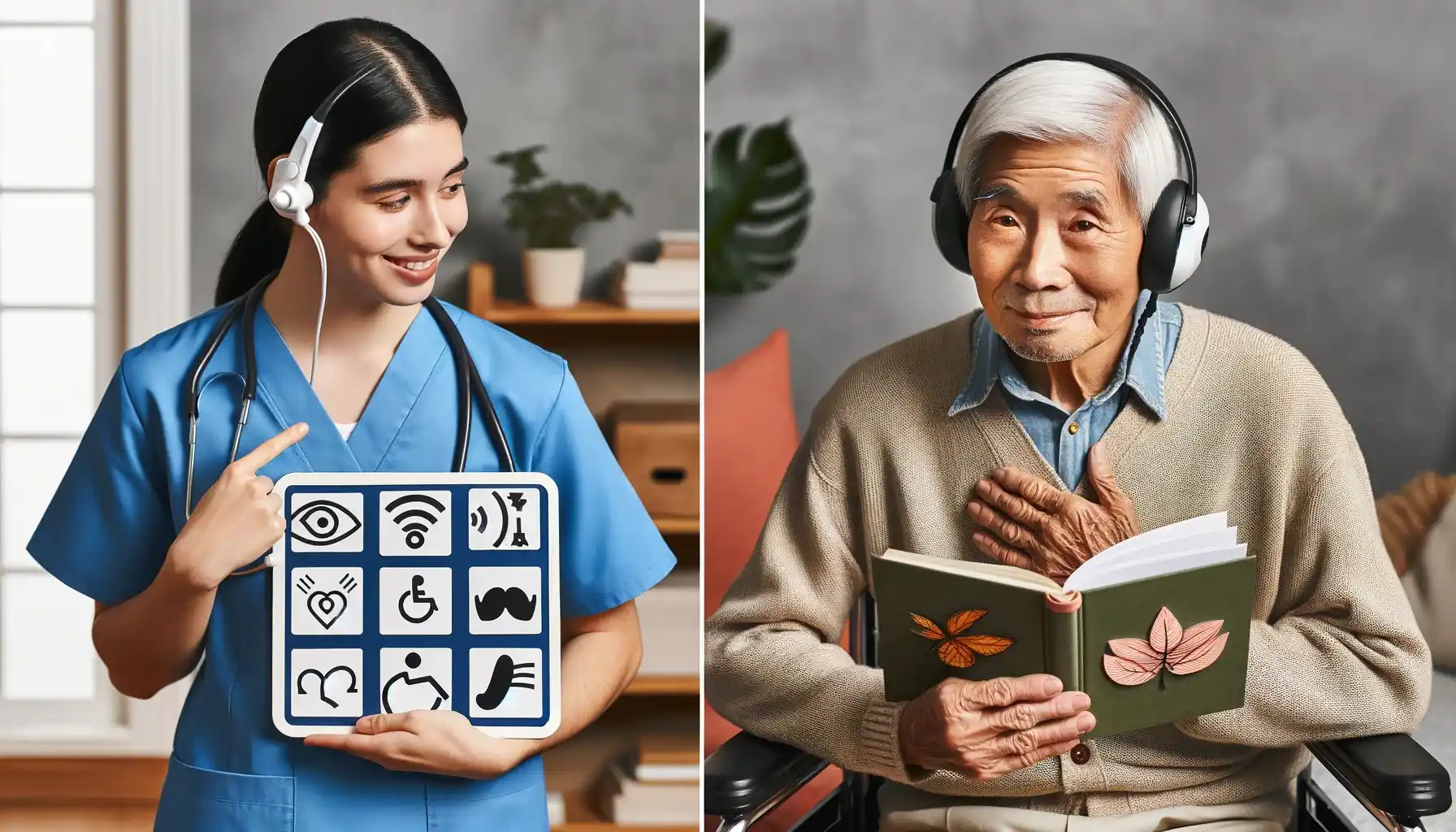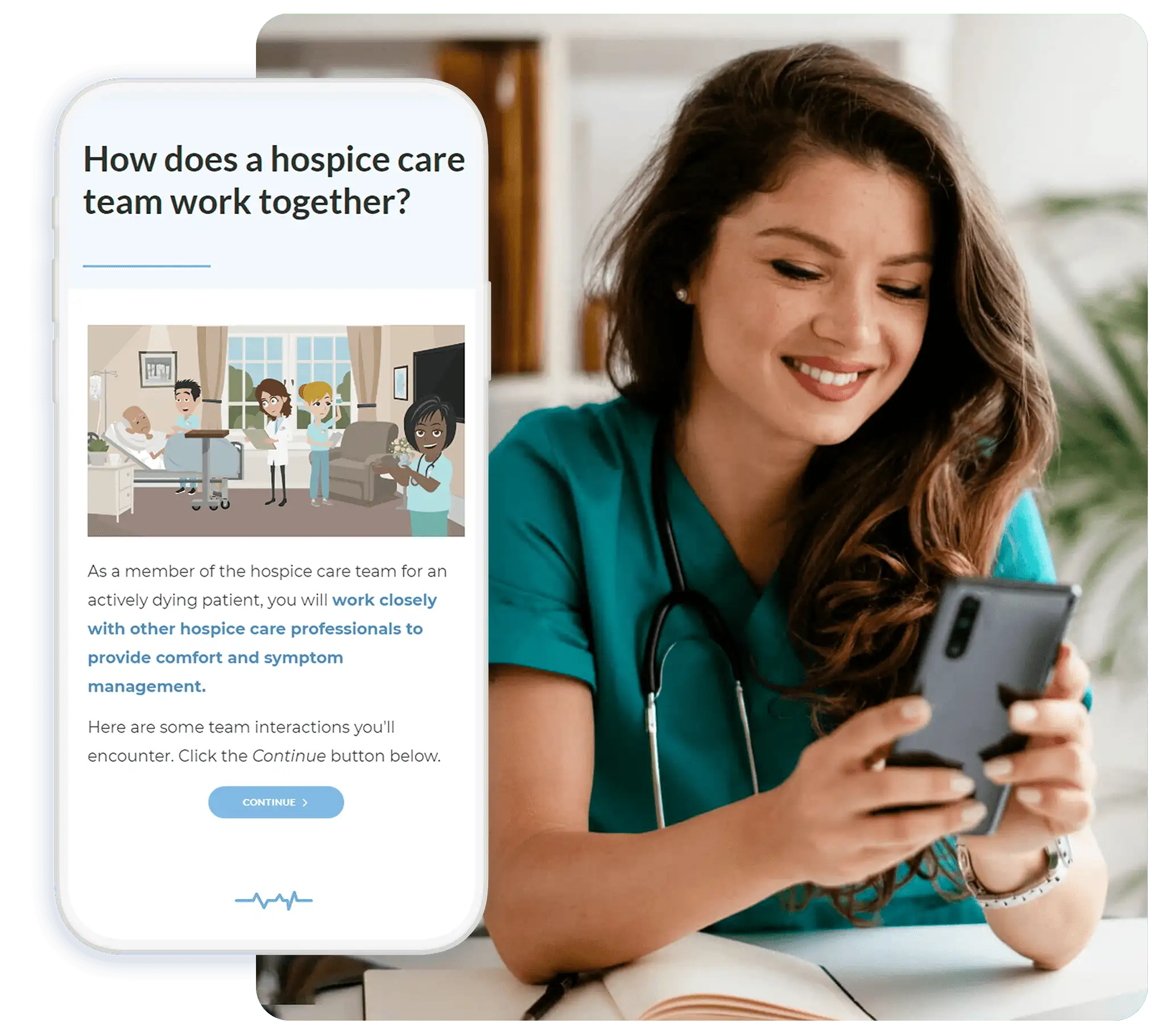Hospice Communication Skills Training for Care Teams
Embark on an immersive learning journey about hospice communication skills to improve patient care in hospice and palliative care environments. This course offers a comprehensive guide, from basic verbal and non-verbal communication principles to advanced strategies for overcoming obstacles and resolving conflict. It is your navigational chart to perfecting patient-clinician interactions.
Skills You’ll Learn:
- Master Verbal and Non-Verbal Cues: Learn to decipher and utilize both spoken and unspoken forms of communication effectively in this training program.
- Enhance Active Listening: Sharpen your listening ability, and work on communicating with hospice patients and families so they feel heard and understood.
- Cultivate Presence: Develop the skill of being fully present, offering comfort and reassurance through your attentiveness.
- Navigate Communication Barriers: Learn strategies to overcome common obstacles in communication for clearer understanding.
- Embrace Diversity in Communication: Understand how cultural differences impact communication and tailor your approach accordingly.
- Collaborate Efficiently: Strengthen your communication within the interdisciplinary group for cohesive patient care.

Course Features
This online hospice communication skills training is built using Continua Learning action and skill-focused training:
- Action-Oriented Learning: Instead of just absorbing information, your staff will practice actions directly contributing to your agency’s success.
- Enhanced Hospice Compliance: With real-world scenarios, staff are better prepared for audits, ensuring your agency exceeds compliance standards.
- Engaging & Interactive: Gone are the monotonous click-next formats. Our courses are created with interactive elements that engage and reinforce learning.
- Patient Satisfaction: Real-world action-focused training leads to more competent care, directly impacting patient satisfaction and your agency’s reputation.
Hospice Communication Skills Training Course Description:
Introduction to Hospice Communication Skills
Welcome to “Hospice Communication Skills Training for Care Teams,” a foundational course for those stepping into the compassionate world of hospice and palliative care. Your journey begins with understanding the essence of effective communication in end-of-life care.
Verbal and Non-Verbal Communication in Hospice
You’ll delve into the nuances of verbal and non-verbal cues, decoding the silent language of gestures and expressions that speak volumes in palliative settings. Learn to use these cues to establish trust and empathy with patients and their families, and communicate with dementia patients on hospice.
The Art of Active Listening
Active listening is the cornerstone of clinical communication skills. Engage in role-play scenarios that hone your ability to listen, not just hear, fostering a deeper connection and understanding with those you care for.
Presence: Being There When It Counts
Presence is more than just being in the room. It’s about offering your undivided attention and emotional support. Discover techniques to enhance your presence, making every moment count in palliative medicine.
Overcoming Communication Barriers
Communication barriers can hinder the goals of care. This module equips you with the tools to navigate and dismantle these obstacles, ensuring clear and compassionate dialogue.

CONTINUA LEARNING
Simplify Your Hospice Team’s Training and Skill Building
A complete online solution for your agency: more than 125 hospice courses, caregiver in-services, training plans, and more.
Diversity: A Spectrum of Communication
Embrace diversity in communication. Learn how cultural backgrounds influence interactions and tailor your approach to meet the unique needs of each patient and family.
Synergy in the Interdisciplinary Team
Effective communication within your team is pivotal. Strengthen your collaborative skills to ensure seamless, patient-centered care in the hospice setting.
Conflict Resolution: Harmony in Care
Conflicts, though challenging, are part of the healthcare landscape. Equip yourself with strategies to resolve conflicts through effective communication practices, promoting a harmonious environment for patients and care providers alike.
The Impact of Your Words and Actions
Wrap up the course by understanding the profound effect of communication skills training on patient and family experiences. Reflect on the lessons learned and how they translate into real-world practices in end-of-life care.
Who Is This Course For?
If you’re a clinician or caregiver stepping into hospice and palliative care, this course is your stepping stone to mastering the art of communication.
Embark on this journey to elevate your communication skills, making every word count in the delicate tapestry of hospice care. Start training today and transform how you connect with patients and families at the end of life.

How to Get Started with Hospice Communication Skills Training
This course is designed for hospice nurses, social workers, chaplains, nursing assistants, volunteers, and all direct and indirect care team members at a beginner to intermediate level.
How to Start Training
This course is part of a yearly subscription to Continua Learning. Continua Learning delivers over 200 hospice training courses and aide in-services in a mobile solution for easy compliance and tracking it all from one place. Contact us to set up a demo for your agency today!
Elevate your expertise. Enhance patient satisfaction. Start training with the Hospice Communication Skills Training course today.
Hospice Communication Skills Training Continuing Education
Hospice Communication Skills Training offers 1 Contact Hour for Nursing, Certified Nursing Assistants, Home Health and Hospice Aides, Occupational Therapists, and Speech Therapists. Continua Learning is an approved provider of CEUs from the following boards:
- Florida Board of Nursing
- Florida Board Of Occupational Therapy
- Florida Board Of Speech-Language Pathology And Audiology
- Florida Board Of Nursing – Certified Nursing Assistants
Course Reviewer
Margaret (Margie) Fincham holds BSN, MSN, and GCNS degrees from California State University in Domingues Hills, CA.
Margie has extensive experience in home health and hospice as a Case Manager and Branch Manager. She holds many certificates in hospice, home health, and wound care. Margie has written courses for Caregivers in both English and Spanish.
FAQ
How are role-play methods used to teach communication to care teams?
Role play is a crucial component of the training course, utilized to mimic real-life situations that medical students or experienced practitioners may encounter when providing palliative care. This technique allows care providers to practice the advanced communication skills required to converse with patients and their families in the sensitive context of end-of-life care.
How does hospice communication skills training for care teams improve the treatment of dying patients?
Training improves the healthcare providers’ ability to engage in crucial conversations, such as advance care planning, with patients and their families. Evidence from a systematic review in BMC Palliative Care shows that this training can improve empathy and patient outcomes signs of patient satisfaction.
What resources are available for medical education in hospice communication?
Various resources are available, from full-text academic articles in journals such as J Palliat Med to practical resources from palliative care education providers such as the European Association for Palliative Care and the Center to Advance Palliative Care. Additionally, numerous BMC palliative care publications also offer insights into this field.
Is there a systematic review of the impact of palliative care communication training exercises?
Yes, a systematic analysis in BMC Palliative Care has evaluated the impact of communication training on care for patients at the end of life. The review indicated that such training dramatically enhances the potential for quality care, affirming communication skills training as valuable and necessary in palliative care settings.

